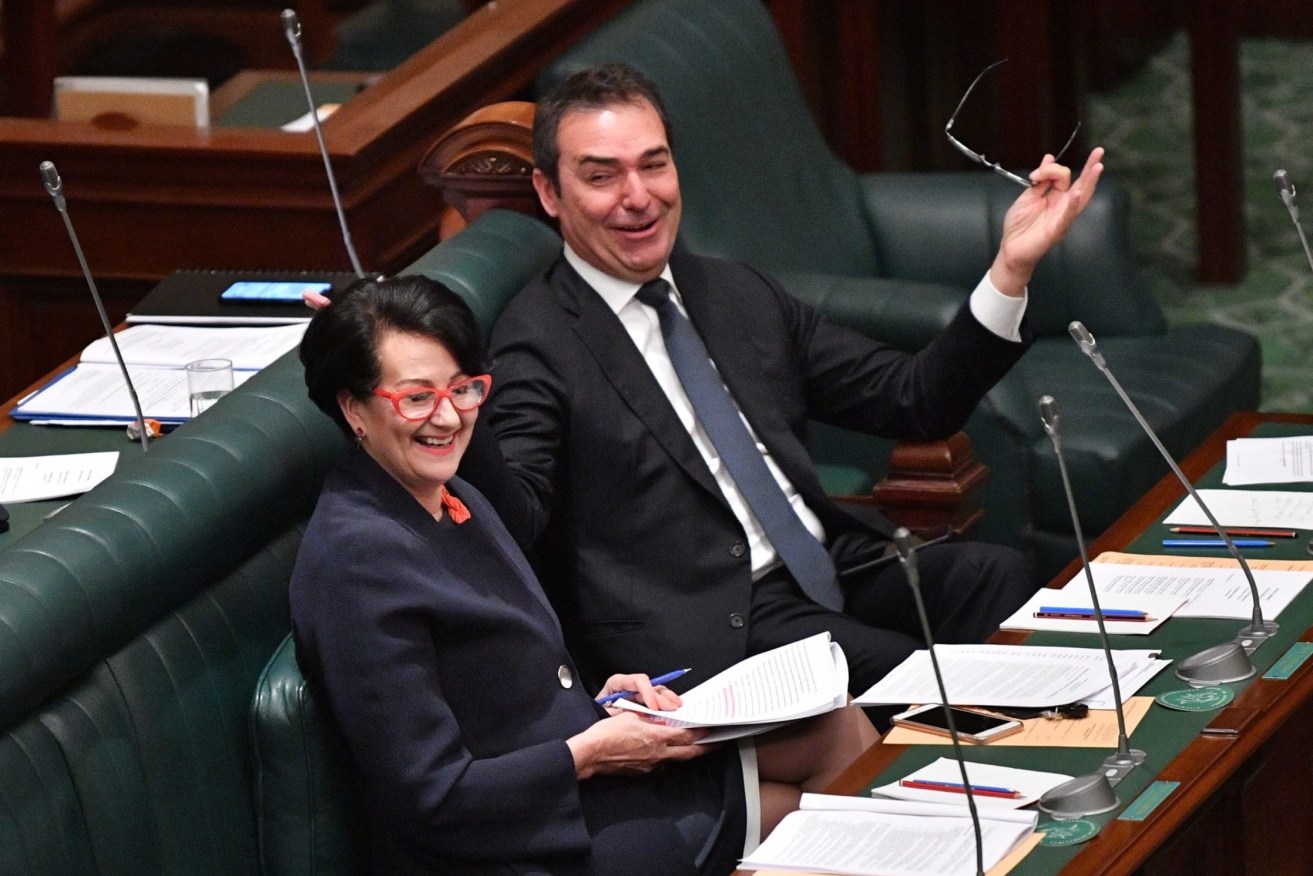‘No fair-minded person could find against me’: Chapman’s inquiry defiance
Attorney-General Vickie Chapman has blasted “incomplete and inadequate” evidence and “a blatant denial of procedural fairness” in a last-ditch bid to persuade a parliamentary inquiry to exonerate her of claims of conflict of interest, misleading parliament and breaching the ministerial code of conduct.

Vickie Chapman, in parliament with Premier Steven Marshall in 2018, has hit back at the inquiry examining her conduct. Photo: David Mariuz / AAP
In a final submission sent to the cross-party committee late yesterday, Chapman’s lawyer, prominent parole board chair Frances Nelson QC, argues the inquiry must “not become a forum simply to inflict reputational damage or to achieve some political advantage” – before launching into the credibility of the committee’s Counsel Assisting, Dr Rachael Gray QC.
“The fact that Dr Gray was socialising with the Shadow Attorney-General and the Hon Tom Koutsantonis MP shortly before the Select Committee was formed does not assist public perception of impartiality,” Nelson writes.
“None of the evidence before the committee is in any way sufficient to support ‘findings’ by Dr Gray.”
Gray this week delivered a scathing assessment of the Deputy Premier’s role in single-handedly vetoing a $40 million port proposal on her native Kangaroo Island.
The port’s rejection prompted the exit from the island of its proponent, forestry company Kangaroo Island Plantation Timbers.
Gray found Chapman had a “perceived and actual” conflict in making the decision, arguing she had later misled parliament on several occasions about factors including the proximity of her property to forests impacted by the development and the location of haulage routes relative to the property of her former parliamentary colleague, KI mayor Michael Pengilly.
Gray further recommended Chapman, along with Premier Steven Marshall and other bureaucrats, should be referred to the state Ombudsman for further investigation.
But Nelson rejected those arguments, saying “to suggest that because [Chapman] had inherited property on the island on which she has not lived since 1974 somehow was a dominating factor in her consideration is ludicrous and would not be entertained by any fair or reasonable minded person”.
“There is no evidence that her decision was in any way swayed by the possibility (noting that no truck routes had been approved) that trucks would drive past Mr Pengilly’s property (even if that were to be the case),” she wrote.
“The Minister was obliged to have regard to the effect on the road infrastructure, and the dust, noise, and pollution effect on all the residents of Kangaroo Island.”
Chapman had also revealed a property she had inherited near the venture operated an AirBnB, of which Nelson said: “To suggest Ms Chapman has been operating anything approaching a Bed and Breakfast operation or some tourism venture is simply ludicrous.”
“The reality is that such agistment and limited short-term stays by workers have come at a loss to Ms Chapman,” she argued.
Nelson emphasised that Chapman did not realise her property was adjacent land that, while privately owned, was contracted to KIPT for deforestation, saying: “The unchallenged evidence of Ms Chapman is that when she made her decision she was unaware that there was any contractual arrangement between the owners of the pine plantation … and KIPT.”
“The mere fact of ownership of land on Kangaroo Island does not create either an actual conflict of interest nor a perceived conflict of interest,” she insisted.
Nelson rejected suggestions the minister held a briefing for the KI council, after councillor Graham Walkom, an avowed opponent of the KIPT plan, told the committee: “The minister briefed council on the process and status of the approval… several weeks before her formal decision.”
“There was no secret meeting… the Minister met with the Kangaroo Island Council Mayor and the Bush Fire Recovery Coordinator in relation to rebuilding sports and community facilities, recovery of bush fire response expenditure from CFS, and other matters arising out of the [2019-20] bushfires,” Nelson said.
She argued the inquiry held no credibility because Labor member Tom Koutsantonis had failed to recuse himself after she had earlier accused him of “a reasonable apprehension of bias”.
“No response has been made to that submission,” she noted.
“The Honourable Member continues as part of the committee.
“As a result, no weight can be given to any Report emanating from the Committee.”
She said Chapman’s decision to veto the port was driven by the proposal’s “likely impact on the island’s terrestrial fauna due to the risk of vehicle strike”, saying: “The Minister’s decision demonstrably was on the merits of a recommendation that provisional approval might be given to the development subject to a number of significant reserved matters requiring further work to be done and many conditions to be imposed on the development.”
“Absent those conditions and an ability to monitor them ultimate approval would not be given,” Nelson said.
“There is no reliable evidence that the Minister had either a conflict of interest or a perceived conflict of interest.
“To find a conflict of interest, the Committee must find that the Minister’s decision was influenced by private interests… no fair-minded person could reach that conclusion.”
Accordingly, she argued “the minister has not breached the Ministerial Code of Conduct [and] has not misled the Parliament”.
“An adverse report in relation to this hasty, inchoate, incomplete inquiry – tainted as it is by apprehensions of bias – would not reflect well on the Honourable Members.”




